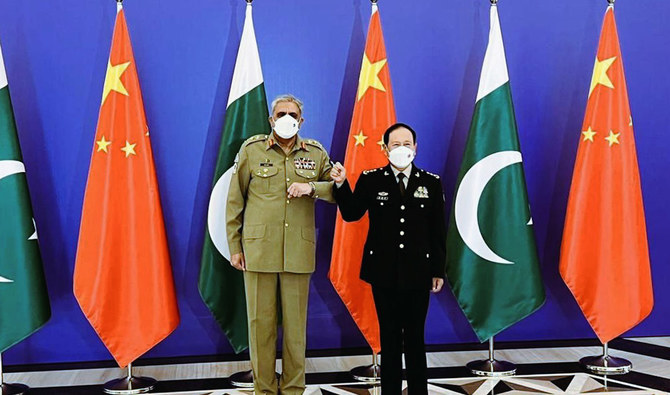ISLAMABAD: China’s defense minister has expressed his gratitude during a meeting with Pakistan’s army chief General Qamar Javed Bajwa for taking necessary steps to provide a safe environment for energy and infrastructure projects jointly carried out by the two countries, said the military’s media wing, ISPR, on Monday.
The China-Pakistan Economic Corridor (CPEC) was launched in 2013 to strengthen the economy of the South Asian country and increase regional connectivity to ensure greater prosperity.
Originally valued at $47 billion, CPEC is now worth over $60 billion and includes construction projects focusing on ports, roads, bridges, special economic zones and hydroelectricity dams.
Thousands of Chinese nationals have also been working on these projects in Pakistan, though many of them were targeted by militant factions in different parts of the country which made the authorities in Beijing take up the issue with Pakistani officials.
China’s defense minister General Wei Fenghe met the army chief who is on a two-day visit to Beijing, saying his country valued its relations with Pakistan and its army and looked forward to expanding this cooperation.
According to the ISPR, the defense minister said the development of CPEC “aimed at bringing more benefits & prosperity to the people of both countries” while calling the “Pak-China military cooperation as an important pillar of bilateral relations.”
“The Defense Minister thanked [the chief of army staff] for special measures taken for provision of safe and secure environment to CPEC projects in Pakistan and efforts toward regional stability,” the statement added. “He expressed satisfaction over progress on CPEC and hoped for timely completion of the project.”
Earlier this year, a group of Chinese academics were killed in a suicide blast that took place at the entrance of Confucius Institute at the University of Karachi.
The incident led to the suspension of academic activities and all Chinese teachers decided to return to their country.
Speaking to the army chief, the Chinese defense minister also conveyed his grief over the devastation caused by recent floods in Pakistan due to climate change and offered condolences to the families of victims.
He said China was willing to provide technical assistance for flood relief efforts in Pakistan while praising the army’s rescue and relief efforts in flood-affected areas.
The army chief thanked the defense minister for his sentiments and continued Chinese support to his country.
















